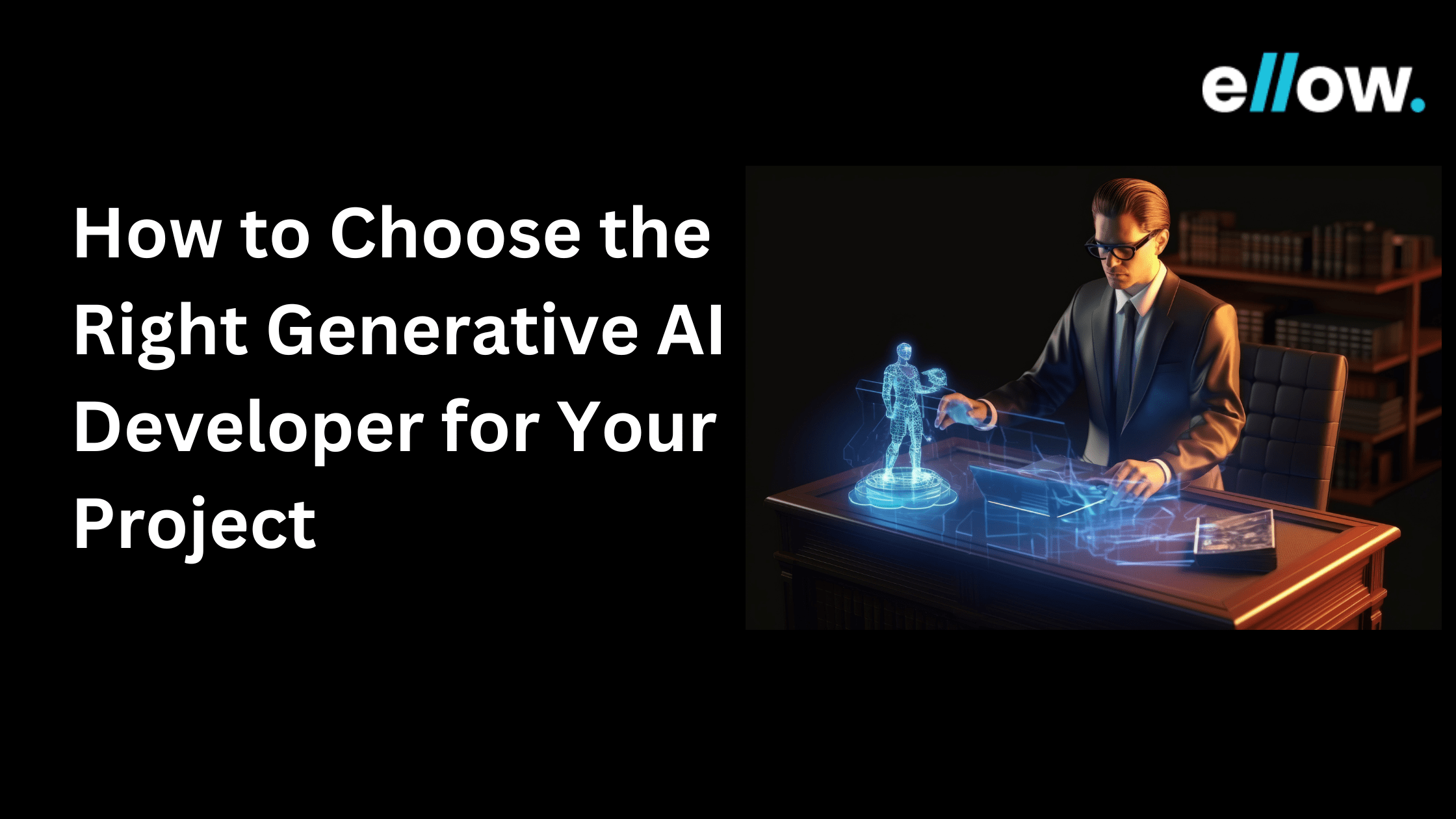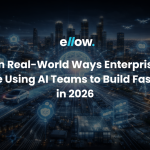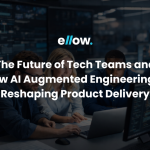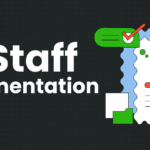Did you know that the global generative AI market is projected to reach a staggering $110.8 billion by 2030, with a remarkable CAGR of 34.3% from 2022? As generative AI continues to reshape industries, its potential seems limitless. Fei-Fei Li, a leading AI expert, perfectly encapsulates this sentiment: “Generative models are opening up a new paradigm of creativity and efficiency in AI. The potential for developers to shape tools that can learn, create, and even inspire is boundless.” This boundless potential has driven an ever-growing demand for skilled professionals in the field.
In this blog, we’ll guide you through the essential steps and considerations for selecting the best Generative AI developer, ensuring that your project not only meets expectations but also exceeds them, paving the way for unprecedented growth and creativity.
What is a Generative AI Developer?
A Generative AI Developer specializes in creating AI models that produce new content – ranging from text and images to data — rather than just analyzing what already exists. By utilizing advanced technologies like GPT, GANs, and VAEs, these developers enable businesses to automate content creation, enhance user interactions, and drive innovation across various sectors.
Core Responsibilities
Generative AI developers play a pivotal role in the development and deployment of machine learning models capable of creating new content. Their core responsibilities include:
- Model Development: Designing and building advanced models like GPT for natural language processing or DALL-E for image generation. This involves defining the model architecture, selecting appropriate algorithms, and integrating components to achieve desired outputs.
- Data Preparation: Collecting, cleaning, and preprocessing large datasets to ensure they are suitable for model training. This includes removing noise, normalizing data, and addressing missing values to enhance model performance.
- Training and Fine-tuning: Training models using extensive datasets, optimizing hyperparameters, and monitoring progress to improve accuracy and efficiency. Fine-tuning pre-trained models for specific tasks is also common to enhance performance.
- Evaluation and Testing: Assessing model performance through rigorous testing and using various metrics to evaluate the quality of generated content, ensuring it meets standards for realism and relevance.
- Collaboration: Working with cross-functional teams, including data scientists, product managers, and UX/UI designers, to align generative models with broader business goals. This collaboration ensures the generated content effectively addresses user needs and enhances overall user experience.
However, to excel in this role, generative AI developers must possess a robust skill set that includes proficiency in programming languages like Python, deep learning concepts, data preprocessing techniques, model training expertise, and familiarity with AI frameworks such as TensorFlow and PyTorch. By combining these skills and responsibilities, generative AI developers drive innovation, creating powerful solutions that redefine content generation across various sectors.
Understanding Your AI Project Requirements
Before you embark on the exciting journey of hiring a Generative AI Developer, it’s essential to pause and reflect on your project scope and requirements. According to a recent survey by McKinsey, 70% of digital transformation projects fail, often due to unclear objectives or mismatched skills. To avoid falling into this statistic, it’s crucial to clarify the specific goals you aim to achieve with generative AI. Think of this as laying the foundation for a successful partnership—one that can lead to groundbreaking innovations and creative solutions tailored to your unique needs.
- Define Project Goals :Start by clearly defining your project goals. Are you looking for content generation, chatbot development, or data modeling? Clarifying the specific output you need helps create a focused vision, so, take a moment to visualize the impact your project could have on your business or community. According to a Deloitte survey, 63% of organizations that clearly define their project objectives report higher success rates in AI implementation. For instance, a retail company aiming to enhance customer engagement might prioritize hiring a developer with expertise in chatbot solutions to facilitate personalized shopping experiences. On the other hand, a marketing firm might seek a developer proficient in content generation to automate personalized email campaigns and social media posts.
- Technology Stack: Next, think about the technologies that will bring your vision to life. Will you be utilizing cloud platforms like AWS or Azure, or do you have custom solutions in mind? A Gartner report indicates that businesses leveraging cloud services enjoy a 20-30% reduction in operational costs—a benefit that could help you reinvest in other areas of your project. By understanding your technological landscape, you can determine the skill sets required in a developer.
- Experience Level: Lastly, consider the experience level required for your project. Junior developers may be suitable for less complex tasks, while mid-level or senior developers are better equipped for intricate projects that demand a deeper understanding of machine learning principles and generative models. Aligning the developer’s expertise with the project’s complexity ensures you get the most out of their skills. For instance: if you’re developing a generative AI model for medical diagnostics, you’ll want to seek out a seasoned developer with extensive experience in neural networks to ensure your project thrives.
By carefully defining your project goals, technology stack, and the required experience level, you create a clear roadmap that guides you in hiring the right Generative AI Developer.
Evaluating Skills and Expertise: Choosing the Right Generative AI Developer
So, are you ready to unlock the full potential of generative AI? The success of your project highly depends on the skills and expertise of the developer you choose. Consider a leading e-commerce platform that implemented generative AI to personalize shopping experiences, resulting in a 25% increase in customer engagement. The secret behind this success? The right generative AI developer with a unique blend of technical and soft skills.
As generative AI continues to redefine creative boundaries, selecting a developer with the right blend of technical prowess and interpersonal skills is essential for delivering innovative solutions tailored to your project’s needs. Let’s take a closer look at the skills and attributes you should consider during the evaluation process:
Technical Skills
- Programming Languages: Proficiency in programming languages such as Python and R is fundamental. Python is widely used for machine learning and data analysis, while R is beneficial for statistical modeling.
- Deep Learning Frameworks: Familiarity with frameworks like TensorFlow, PyTorch, and Keras is critical for building and training deep learning models. These tools help streamline the development of complex architectures necessary for generative tasks.
- Modeling Techniques: Expertise in various generative modeling techniques, such as Generative Adversarial Networks (GANs), Variational Autoencoders (VAEs), and Transformers (like GPT), is essential for developing effective AI solutions that can create new content.
- Data Preprocessing: Make sure the developer understands data cleaning and preprocessing techniques, as it ensures that the input data is suitable for training models. Skills in data normalization, augmentation, and feature extraction are crucial for enhancing model performance.
- Machine Learning Algorithms: A solid grasp of machine learning principles, including supervised and unsupervised learning, is very important, as it allows developers to choose the right algorithms for specific tasks.
- Natural Language Processing (NLP): For projects involving text generation, familiarity with NLP techniques, including tokenization, named entity recognition, and sentiment analysis, is important to ensure the generated content is clear and relevant. So, by prioritizing developers with strong NLP skills, you can enhance user interactions—such as in chatbots—by ensuring intelligent and empathetic responses..
- Cloud Computing Platforms: Experience with cloud services such as AWS, Google Cloud, or Azure is beneficial for deploying models at scale. Knowledge of cloud architecture can help ensure your solutions are both cost-effective and scalable.
- Version Control Systems: Proficiency in tools like Git is essential for managing code changes and collaborating with other developers, ensuring that the project remains organized and maintainable.
Soft Skills
- Problem-Solving: Generative AI projects often present unique challenges. Developers should possess strong analytical and problem-solving skills to navigate complex issues and deliver effective solutions.
- Creativity: The ability to think outside the box is crucial in generative AI, where innovation drives the creation of unique content. A creative developer can develop novel approaches to solving problems and producing content.
- Communication: Effective communication skills are essential for collaborating with cross-functional teams. A good developer should be able to articulate complex concepts to non-technical stakeholders and incorporate feedback into their work.
- Adaptability: The field of AI is rapidly evolving. Top Generative AI developers need to be adaptable, keeping up with the latest advancements and integrating new technologies and methodologies into their work.
- Teamwork: Collaborating with designers, product managers, and other developers is often necessary for successful project execution. Strong interpersonal skills enable a developer to work effectively in diverse teams.
- Attention to Detail: In generative AI, small nuances can significantly impact the quality of the output. Developers must exhibit meticulous attention to detail to ensure the models are functioning as intended and generating high-quality results.
- Project Management: While not always a formal requirement, some understanding of project management principles can help developers meet deadlines and manage their workloads effectively.
By carefully evaluating both the technical and soft skills of potential candidates, businesses can identify the best Generative AI professionals who not only possess the necessary expertise to create innovative solutions but also align with their organizational culture and project goals. This thorough evaluation process is crucial for ensuring the success of your generative AI initiatives. When assessing candidates, remember that you’re not just filling a position; you’re laying the groundwork for innovation and long-term success in your organization.
Conducting a Thorough Evaluation Process
Choosing the right generative AI developer goes beyond simply checking off technical skills from a list. A thorough evaluation process is essential to ensure that the selected candidate not only possesses the necessary expertise but also fits seamlessly within your organization’s culture and project goals. Here are three key components to consider during this evaluation:
- Interview Strategies: Prepare targeted interview questions to explore the candidate’s experience with relevant technologies. Ask about their proficiency with machine learning frameworks and past projects, including challenges faced and solutions implemented. This will help assess their problem-solving skills, adaptability, and communication abilities, ensuring alignment with your company culture.
- Portfolio Review: A candidate’s portfolio is essential for understanding their capabilities. Review past projects to evaluate the quality and impact of their work, focusing on case studies that demonstrate their ability to achieve meaningful outcomes in areas like customer engagement and content personalization.
- Practical Assessments: Use practical coding challenges or project simulations that reflect real-world scenarios they may encounter. This approach not only tests their technical skills but also offers insight into their thought processes and creativity in problem-solving.
By following these evaluation strategies, you can effectively identify a Generative AI Developer who possesses the necessary skills and fits seamlessly into your organization.
The Importance of Staying Current in Generative AI Development
In the fast-paced realm of generative AI, developers must stay informed about the latest trends and challenges. With new technologies and methodologies continually emerging, understanding advancements such as GPT-4 and diffusion models is crucial for maintaining a competitive edge.
Adaptability is equally important; as project demands shift, developers must pivot strategies and incorporate new tools. This includes addressing ethical considerations like bias mitigation and data privacy, which require ongoing education about best practices and regulatory changes.
A notable example of successful adaptability can be seen in Amazon, which aimed to enhance customer engagement through generative AI. By employing a skilled developer well-versed in the latest NLP techniques, the team implemented a solution that generated personalized product recommendations and dynamic marketing content based on user behavior. This resulted in a 30% increase in customer engagement and a 20% boost in conversion rates. Such success highlights the necessity for developers to remain current and adaptable, ensuring impactful results in an ever-changing landscape.
Making the Right Choice in Generative AI Development
By carefully evaluating candidates based on their technical and soft skills, you can Hire Generative AI Professionals who are a strong fit for your organization’s needs. Remember, selecting the right Generative AI Developer is crucial for the success of your project. So, take your time during the hiring process; as it will pay off when a well-chosen developer elevates your project and drives innovation.
For those looking to deepen their understanding of generative AI, consider reading books like “Generative Deep Learning” by David Foster and “Artificial Intelligence: A Guide to Intelligent Systems” by Michael Negnevitsky. Additionally, reputable websites such as Towards Data Science and the AI section of MIT Technology Review offer insightful articles. Engaging in forums like AI Stack Exchange and attending conferences such as NeurIPS or the AI Summit can also help you connect with experts and expand your network in the field.
With careful consideration and a commitment to ongoing learning, you’ll be well-equipped to navigate the dynamic landscape of generative AI and select the Best Generative AI developers for your project.






